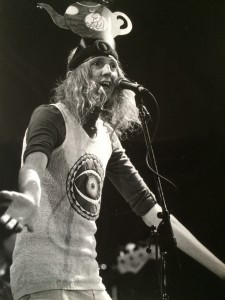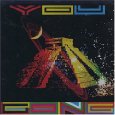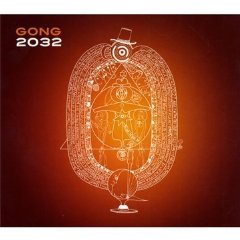Podcast: Play in new window | Download
Subscribe: RSS
 Hear a sound portrait of Gong in the Echoes Podcast
Hear a sound portrait of Gong in the Echoes Podcast
The voyage of the original Star Trek ended in 1969, but another band of space travelers called Gong launched that year only just lost their captain. Daevid Allen, founder of Gong, announced a few weeks ago that he was dying of cancer and today, March 13, he has left the planet. I suspect he would’ve appreciated the irony of that date. Allen was 77 years old.
I fell in love with Gong when I discovered them through You, the third album in the Radio Gnome Invisible Trilogy. Driving songs like “Master Builder” and spacescapes like “A Sprinkling of Clouds” were the soundtracks to so many psychedelic fantasies. And I wasn’t doing drugs. When I started doing radio, Gong was one of the go-to bands on Diaspar, WXPN‘s progressive rock show. I thought I’d never get to see the band, and in fact, never saw the vintage incarnation of that group with Steve Hillage, Didier Malherbe, Mike Howlett, Pierre Moerlen, Tim Blake and Gilli Smythe. But in 1978 Allen came over with his then wife Gilli and played the Zu Manifestival of Progressive Rock. The two fronted Zu Band which would go on to become New York Gong and then Materiel with Bill Laswell. They essayed the entire Radio Gnome Invisible Trilogy right up until they sang the line, “Cops at the door” from “Perfect Mystery” at which point, the cops coincidentally arrived and turned off the power. But Allen continued in the dark, singing into the blackened theater.
I had my first interview with Allen backstage. He was always a lively subject, full of puns, spiritual and philosophical observation, usually a mixture of all three. My main memory is being surprised that the guy who created Pothead Pixies was disavowing drug use. “We did drugs and found out what they were about so you don’t have to,” he proclaimed. I think he was serious.
I interviewed him again at WXPN later in 1979 when he was touring with New York Gong and playing The Hot Club in Philadelphia. I remember arranging for him to meet Robert Fripp during his Frippertronics tour. He was playing in Plastic Fantastic Records in Bryn Mawr where I worked briefly. Our next meeting came in 1980, when I interviewed him at KALX in Berkeley. My strongest recollection is that in the process of answering a question, Allen leaped up, and still doing one of his speed raps, ran out the door, down the hall, down the elevator and out into the courtyard before returning to the studio, still rambling. It was a long time between interviews. My next and now last interview with Allen was at the 2009 edition of Nearfest where Allen was playing with a new edition of Gong that included Hillage, Smythe, and Howlett from the classic line-up. He was more wizened, although Allen was one of those people who looked old even when he was young. But he hadn’t changed as he unfurled tales of Gong, both real and fanciful.
 At it’s height, Gong was a free-wheeling psychedelic band that wrapped itself in its own myth, namely, that we’re in contact with mystical, acid drenched beings from the Planet Gong. It’s never quite clear whether the band treat this as fact or metaphor. Like Sun Ra, they seem to live the life and speak the jargon, whether on-stage or off. Born in Australia, Allen founded the band in 1969 after visa issues forced him to leave England and another progressive rock band, The Soft Machine. Speaking backstage at Nearfest 2009 in Bethlehem, Allen articulated the ethos of Gong.
At it’s height, Gong was a free-wheeling psychedelic band that wrapped itself in its own myth, namely, that we’re in contact with mystical, acid drenched beings from the Planet Gong. It’s never quite clear whether the band treat this as fact or metaphor. Like Sun Ra, they seem to live the life and speak the jargon, whether on-stage or off. Born in Australia, Allen founded the band in 1969 after visa issues forced him to leave England and another progressive rock band, The Soft Machine. Speaking backstage at Nearfest 2009 in Bethlehem, Allen articulated the ethos of Gong.
Daevid Allen: Well Gong has an ongoing story to it. So that is kind of a backbone and guide. It really is a teaching story–in the old Sufi sense– it’s meant to be a story. But we never wanted it to sound serious because then everyone embraces it as a religion– a terrifying prospect. So we made it as silly as we possibly could, so that most people wouldn’t take it seriously.

Daevid Allen @ Nearfest Photo: Gino Wong
Needless to say, psychedelics played an important part in Gong’s creative process.
Daevid Allen: It’s almost like channeling because we were consciously saying there are more intelligent beings than us that wish to work through us. And the acid was really a way of getting rid of our egos so that that could come through as purely as possible.
Gong’s best known work is the Radio Gnome Invisible Trilogy. It tells the tale of Zero the Hero while careening from space to jazz to rock, minimalism and beyond. It also marks two signature sounds of the band, heavenly glissando guitar and deep space echo. Gong guitarist Steve Hillage.
Steve Hillage: If you’re doing music that has a philosophic connection to the universe and space. there is nothing better than creating this unearthly spatial environment with all the unearthly reflections.

Allen & Hillage @ Nearfest Photo: Diliberto
Both Daevid Allen and Steve Hillage claimed to be teetotalers now, but right up to the end, Gong was still making a joyful, hallucinogenic music full of cosmic whimsy and sonic exploration, still traveling the spaceways more than 45 years later.
Allen always represented the whimsical side of progressive rock, creating absurdist Dada theater with his group, wearing goofy costumes and bizarre costumes. Because he was also a poet, he reveled in wordplay, It’s often forgotten that Allen explored tape loops with Terry Riley in the early 1960s and his 1971 solo album, Bananamoon could’ve been a precursor to punk if any punks had actually heard it. Reading Robert Wyatt’s recent biography, Different Everytime, it’s evident that Allen, who was older, was a mentor to Wyatt even before they formed the Soft Machine. It was Pink Floyd’s Syd Barrett who invented glissando guitar, but it was Allen who exploited it to it’s full potential of shimmering heavenly evocations.
Somewhere out there, Daevid Allen is traveling in a flying teapot, finally attaining the nirvana he extolled in life.
You can hear a more extensive interview with Daevid Allen in the Echoes Podcast. Listen below or download it from iTunes.
Here’s some early Gong from 1973, although the black & white cinematography makes them seem a bit creepier looking than they actually were.
Read review of Gong’s 2009 Nearfest performance.
John Diliberto ((( echoes )))


